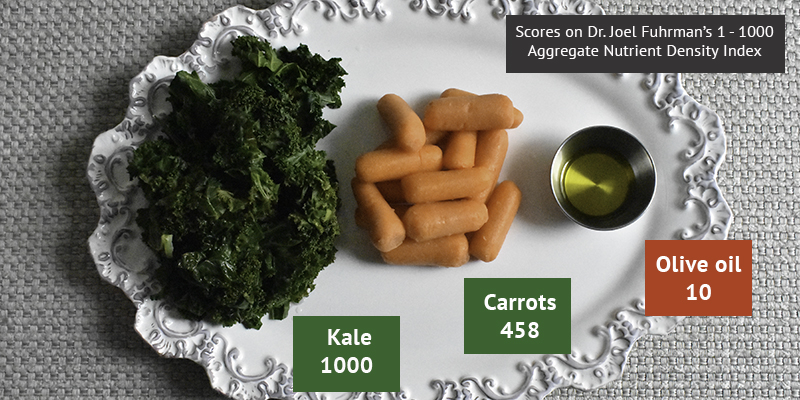What is “Nutrient Density”?
Examples of nutrient density scores. 70 calories of each food is shown here.
“Nutrient Density” refers to the ratio between the amount of beneficial nutrients in a food and its caloric content. Foods high in nutrients (like antioxidants, vitamins, minerals, fiber) and low in calories get a high (favorable) nutrient density score, while foods low in nutrients and high in calories get a low (bad) score.
The gold medalists
There is no single authoritative nutrient density scale, but all of the systems I’ve seen, whether on a 1 - 100 or 1 - 1000 scale, arrive at similar findings. When you look at the leaderboards, the powerhouses are always dark leafy greens like kale, chard, collard greens, and spinach. Dark leafy greens are low in calories and contain many antioxidants, calcium, nitrates, carotenoids and other phytonutrients.
Also on the platform
Other low-calorie, nutrient-rich vegetables follow, such as romaine and Boston lettuce, broccoli, artichoke, and cabbage. Some rankings might surprise you. Even whole foods like bananas, nuts, avocados, and brown rice rank low on nutrient density scales because of their calorie count—i.e., you can get equivalent amounts of nutrients in foods that are much lower in calories.
The losers
Not surprisingly, fast food, processed food, oils, sugary foods, meats, dairy, and eggs are low on all nutrient density scales.
Why getting lots of nutrients matters
Most Americans believe that lots of protein and low levels of fat and carbs are the keys to health and slimness. The obesity rate in the U.S. would suggest that these beliefs are not working. In reality, a focus on whole foods high in nutrients (vitamins, minerals, phytochemicals, and other amazing micro-nutrients) would help improve our health. Nutrients help the body function properly, including the immune system and cellular repair mechanisms, which protect us from chronic diseases. People who call themselves “nutritarians” focus on eating as high on the nutrient density scale as possible.
For more information
Dr. Joel Fuhrman, MD, is the best known proponent of nutritarianism and the person who coined the term. He offers books, welcome kits, checklists, and cookbooks. You can download a .pdf copy of Dr. Fuhrman’s nutrient density chart.

